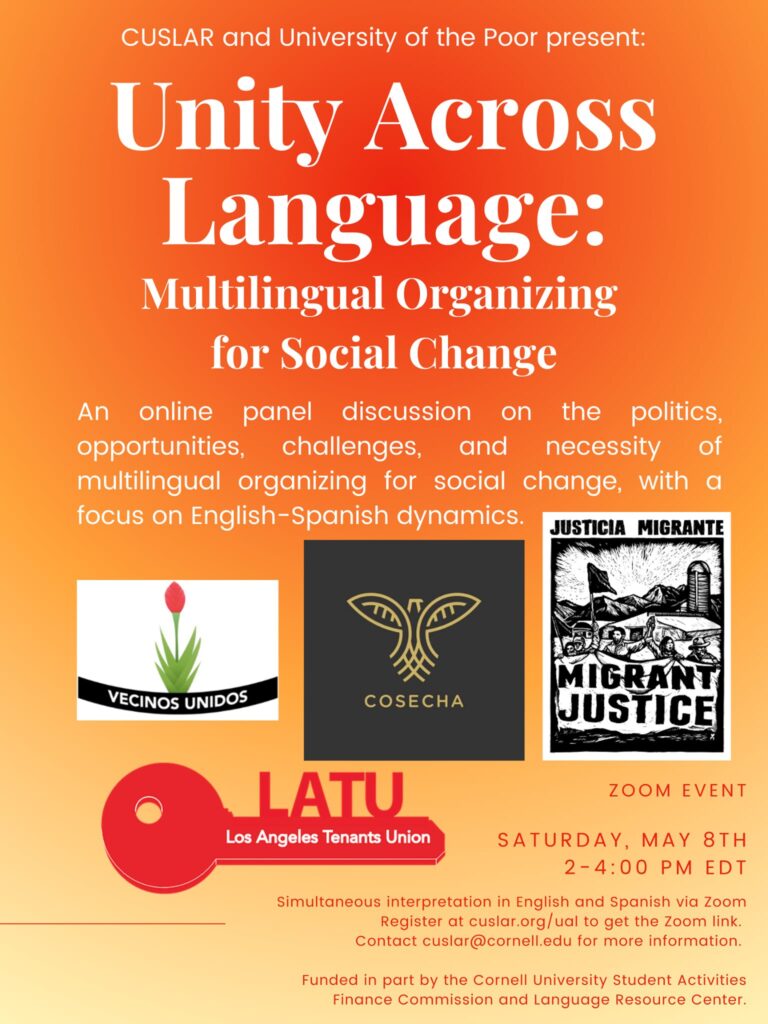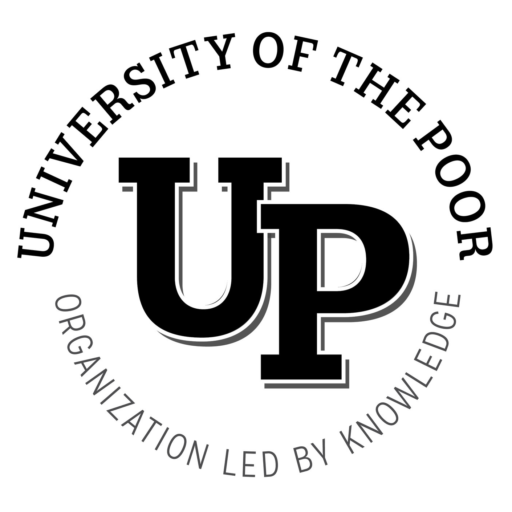By Emiliano Vera
Emiliano Vera is an organizer with the Illinois Poor People’s Campaign, the University of the Poor and the UPoor Unity Across Language team, and the Western Illinois Democratic Socialists of America. Emiliano graduated from Northwestern University in 2016 with a Bachelor’s of Education and Social Policy, and received their Master’s in Governance and Globalization from the Universidad de las Américas Puebla. They are a former candidate for state representative for the Illinois 93rd District. They are now living in their home town of Bushnell, Illinois and working as a teacher at the same school they graduated from.
Below are remarks Vera gave during the“Unity Across Language: Multilingual Organizing for Social Change” panel discussion on May 8, organized by the University of the Poor and the Committee on U.S./Latin American Relations (CUSLAR).

Good afternoon, buenas tardes. I’m Emiliano Vera, and I’m a teacher from Bushnell, IL calling in via Chicago. I grew up between rural Illinois and Puebla, Mexico, in my abuela’s house just 3 blocks away from the forts where the Mexican army successfully defended against a much stronger force of invading European imperialists in a battle that we now celebrate as Cinco de Mayo (which we celebrate in the US, Puebla, and nowhere else). Like many children of immigrants, I felt like I grew up between two worlds, neither of which I fully fit into. But feeling like an outsider brought me into the social movements of the poor and dispossessed.
As a member of the Unity Across Language team, I’ve discussed the feeling of “Impostor Syndrome” that I would get when I first started doing live interpretations for UPoor Zoom classes, and I found out that, actually, I wasn’t alone in feeling that way. That “Impostor Syndrome” is common in lots of children of immigrants who grew up, like I did, feeling like they were between two worlds. And it was through talking about our collective experiences interpreting and translating in spaces that organize the poor and dispossessed that we in the Unity Across Language team found that we had gained a wealth of knowledge and experience that we wanted to share, and that we still had so much more to learn from our comrades who have been doing this work on the ground for years.
This conference today is the fruit of those many discussions. We are here to share our experiences as organizers of the working class, the poor, and dispossessed, across the lines of division drawn by language and instead turning our many tongues into a tool for the unity of our class. In this conference, we hope to turn organizers who work in multilingual spaces into true language warriors who are equipped not just to go be better leaders in their own organizations, but become the leaders of a broad coalition of poor and working people in the US and across the world.
In becoming language warriors, we are joining in a long history of struggle of the poor and dispossessed. The most successful poor peoples’ movements have often been the ones that successfully bridged the divide of language in a way that was intentional, equitable, and central to the mission of their cause. For the enslaved and indigenous people resisting colonization, organizing across language was a matter of survival. The Seminoles united indigenous people and escaped slaves in Florida to resist American wars of conquest for decades, while the Guarani reducciones in Paraguay fought off Portuguese slave raids and Spanish colonial authority for hundreds of years, forging a multilingual state that still has among the highest number of speakers of an indigenous American language. Haiti’s successful revolution was achieved by mobilizing slaves brought to Haiti from across Africa, speaking dozens of different languages, with the promise of freedom and equality through a common humanity.
As capitalism developed and the US took in droves of European peasants fleeing oppression only to turn them into the immiserated industrial proletariat, the most radical sectors of the labor movement were led by socialists, communists, and anarchists who organized among the immigrant workers, holding lively rallies of thousands of people speaking Italian, Russian, Yiddish, German, Polish, Hungarian, and countless other languages. Meanwhile, the despotic Russian Empire that was called the Prisonhouse of Nations was overthrown in the world’s first successful proletarian revolution by a working class unified across their many languages against the oppression of the czar. The multinational, multilingual Union of Soviet Socialist Republics that emerged would prove its commitment to internationalism and unity across language time and time again, for example, in the Baku Conference of the Peoples of the East, gathering activists from across the colonized countries Asia and Africa. And no country has done more for the cause of internationalism for its size than Cuba, which has not only trained high quality doctors and teachers around the world, but also fought side by side the anti-colonial struggle in countries like Angola, where Che Guevara’s “Portuñol” built the solidarity needed for victory against colonialists and apartheid invaders.
As language warriors, we are guided by the wisdom of the struggles of the past. And we desperately need to build that solidarity now. Remember, we’re not just living in the shadow of Trump – immigrant communities are every bit as much under attack now as they were 6 months ago. For some communities, the Biden administration has ratcheted up attacks, for example, increasing the deportation of Haitians to an even higher rate than under Trump. As true leaders of our multilingual class, several of the organizations here led a rally on May Day demanding a halt to Biden’s deportations. It is clear that, as Trumpism refuses to fade away and polite liberals go back to ignoring our children locked in cages and our families being torn apart, we need more than ever to unite our voices as in English, Spanish, French, Kreyol, Tagalog, Chinese, Vietnamese and more we say “Enough!”
Furthermore, we can’t let language organizing be something that we put in a corner for just the immigration activists to worry about. No country is homogenous and speakers of non-dominant languages also tend to be among the most oppressed members of the poor and dispossessed. In the US, 60 million people speak a language other than English at home, 25 million of whom speak English less than “very well”. Over half of those are Spanish speakers, with the other half representing millions of people speaking hundreds of languages. From Larry Itliong, Cesar Chavez and Dolores Huerta uniting Filipino and Mexican agricultural laborers in California into the United Farm Workers, to the Bernie Sanders campaign turning out record numbers of Spanish, Arabic, and Somali speaking restaurant workers to vote in 2020, Unity Across Language means bringing together not just the biggest languages, but the dispossessed from everywhere, regardless of language or immigration status.
Finally, keep in mind that while we are the language warriors for our class, the ruling class has its own language warriors. We know that language is an important front of struggle because of the millions of dollars that the CIA, the State Department, and the Military spend on training people in “strategic languages” for the purpose of expanding and administering the Empire. Businesses hire language specialists to break into new markets. And even well meaning nonprofits can get defanged by the constant lure of grant money from billionaire-funded foundations. Our goal is not just to be proficient in different languages – we must be able to speak the languages of the working class in the way that the working class speaks them, with clarity that comes from having listened to how a people defines its own struggles. In doing so, we are developing new leaders from among the poor and working class, and bring out the voices of leaders from language communities that aren’t heard enough. And one of the amazing effects of Unity Across Language is that, by learning to speak clearly with people in another language, you also learn how to communicate more clearly in your own. In building Unity Across Language, we are also constructing a common consciousness of the international working class.
So, we’ve set high goals for ourselves today. We are building Unity Across Language in order to strengthen our organizing among the poor and dispossessed, in our communities, throughout the country, and across the whole world. We have the models of the struggles of the past and our own experiences in organizing our multilingual class, and we are here to learn from the experiences of other leaders of our class. It is an urgent task, because many of the people that we care about are in as much risk now as ever. But Unity Across Language for the poor and working class means that we must act strategically, not simply translating documents, but learning how to communicate with the poor and raise up leaders among those whose voices are not typically heard. Let’s get started!
